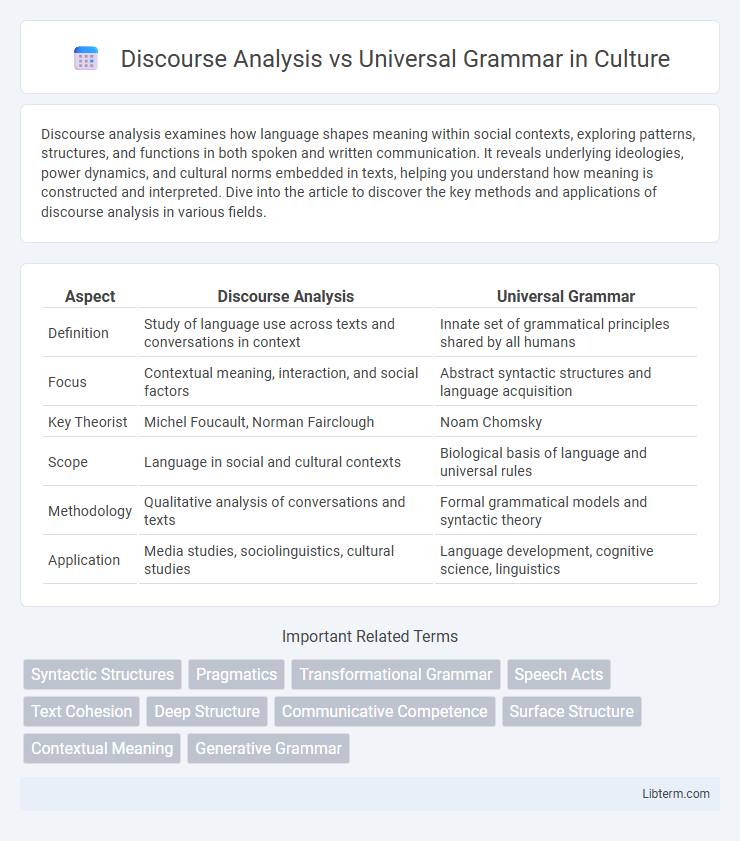Discourse analysis examines how language shapes meaning within social contexts, exploring patterns, structures, and functions in both spoken and written communication. It reveals underlying ideologies, power dynamics, and cultural norms embedded in texts, helping you understand how meaning is constructed and interpreted. Dive into the article to discover the key methods and applications of discourse analysis in various fields.
Table of Comparison
| Aspect | Discourse Analysis | Universal Grammar |
|---|---|---|
| Definition | Study of language use across texts and conversations in context | Innate set of grammatical principles shared by all humans |
| Focus | Contextual meaning, interaction, and social factors | Abstract syntactic structures and language acquisition |
| Key Theorist | Michel Foucault, Norman Fairclough | Noam Chomsky |
| Scope | Language in social and cultural contexts | Biological basis of language and universal rules |
| Methodology | Qualitative analysis of conversations and texts | Formal grammatical models and syntactic theory |
| Application | Media studies, sociolinguistics, cultural studies | Language development, cognitive science, linguistics |
Introduction to Discourse Analysis and Universal Grammar
Discourse Analysis examines language use beyond sentence boundaries, focusing on context, interaction, and social meaning in spoken or written communication. Universal Grammar, proposed by Noam Chomsky, postulates an innate set of grammatical principles shared by all human languages, underlying language acquisition. While Discourse Analysis explores language in real-world contexts, Universal Grammar investigates abstract, inherent linguistic structures.
Defining Discourse Analysis
Discourse Analysis examines language use beyond sentence boundaries, focusing on context, social interaction, and the function of communication in real-life situations. It studies how meaning is constructed through dialogue, narrative structures, and conversational exchanges, highlighting the dynamic nature of language in social settings. Unlike Universal Grammar, which emphasizes innate syntactic structures, Discourse Analysis prioritizes pragmatic and semantic aspects of language in use.
Understanding Universal Grammar
Understanding Universal Grammar involves recognizing it as a theoretical framework positing an innate set of linguistic principles common to all human languages, enabling language acquisition. Discourse Analysis, in contrast, examines language use in context, focusing on the structure and meaning of spoken and written communication beyond sentence level. Research in Universal Grammar emphasizes syntactic structures and cognitive mechanisms that facilitate language learning, distinguishing it from the pragmatic and social considerations central to Discourse Analysis.
Historical Development of Both Theories
Discourse Analysis emerged in the mid-20th century, evolving from pragmatic and sociolinguistic studies that prioritized language use in context rather than isolated sentence structures. Universal Grammar, proposed by Noam Chomsky in the 1950s, revolutionized syntactic theory by asserting an innate, biological linguistic framework shared across all human languages. Both theories developed in response to limitations of behaviorist linguistics, with Discourse Analysis focusing on real-world communication and Universal Grammar on underlying cognitive structures.
Core Principles of Discourse Analysis
Discourse Analysis centers on examining language use beyond the sentence level, focusing on the structure, coherence, and context of spoken or written communication to understand meaning in social interactions. Core principles include analyzing conversational turns, speech acts, thematic organization, and the roles of participants within specific situational frameworks. Unlike Universal Grammar, which emphasizes innate syntactic structures across all languages, Discourse Analysis prioritizes pragmatic and contextual elements that shape language in real-life settings.
Core Principles of Universal Grammar
Universal Grammar (UG) centers on the innate structural rules governing language acquisition, emphasizing a shared set of grammatical principles across all human languages. Core principles of UG include concepts such as recursion, syntactic categories, and parameter settings that guide how children internalize language effortlessly. Discourse Analysis, contrastingly, examines language use in context, focusing on pragmatics and social interaction rather than the inherent, abstract grammar rules proposed by Universal Grammar.
Methodological Differences
Discourse Analysis emphasizes qualitative methods, analyzing language use in social contexts through naturalistic data collection and interpretative frameworks, while Universal Grammar relies on formal theoretical constructs and experimental methodologies to identify innate syntactic principles. Discourse Analysis prioritizes pragmatic and contextual factors influencing meaning, whereas Universal Grammar focuses on uncovering universal, abstract grammatical rules across languages. This methodological divergence reflects Discourse Analysis's emphasis on language as social practice contrasted with Universal Grammar's pursuit of underlying cognitive language structures.
Applications in Linguistic Research
Discourse Analysis explores language use in social contexts, emphasizing pragmatic features and conversational structures for applications in sociolinguistics, language teaching, and communication studies. Universal Grammar provides a theoretical framework identifying innate syntactic principles shared across languages, widely applied in cognitive linguistics, language acquisition research, and syntactic theory development. Combining both approaches enhances linguistic research by integrating syntactic universals with contextual language variation in real-world communication.
Criticisms and Limitations
Discourse Analysis faces criticism for its subjective interpretation and lack of formalized rules, limiting its ability to produce consistent, replicable results across different contexts. Universal Grammar is criticized for its abstract nature and insufficient empirical evidence, particularly in accounting for the vast variability of language use observed in discourse. Both approaches struggle with integrating context-specific meaning, where Discourse Analysis emphasizes pragmatic factors and Universal Grammar prioritizes innate syntactic structures, highlighting a fundamental limitation in explaining natural language complexity independently.
Future Directions in Language Theory
Future directions in language theory emphasize integrating Discourse Analysis with Universal Grammar to better capture context-driven language use and underlying syntactic structures. Advances in computational linguistics and neurolinguistics are fostering models that bridge pragmatic discourse functions with innate grammatical principles, enhancing natural language understanding systems. Emerging research prioritizes cross-linguistic studies to refine universal constraints and contextual variability, offering deeper insights into human language acquisition and processing.
Discourse Analysis Infographic

 libterm.com
libterm.com